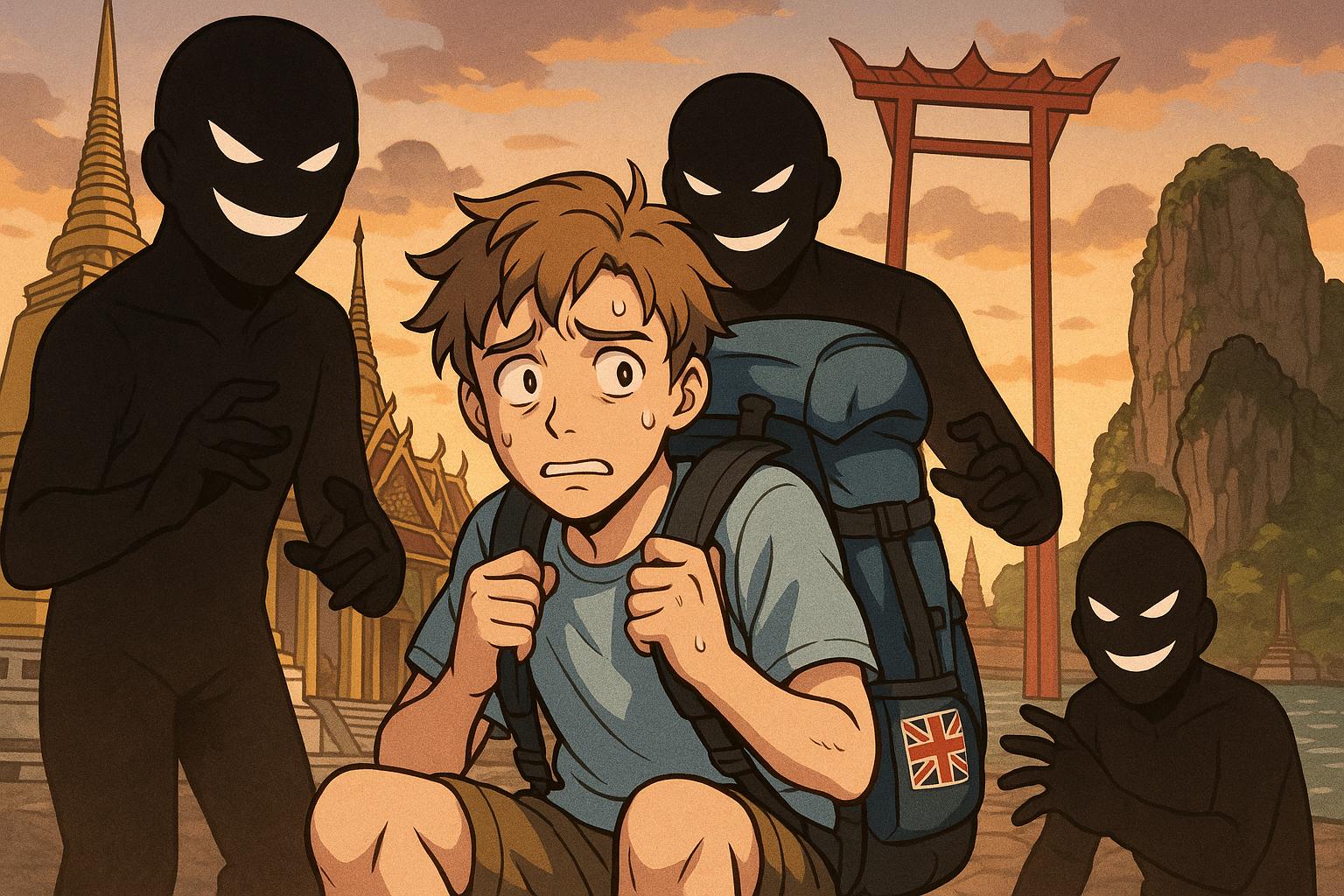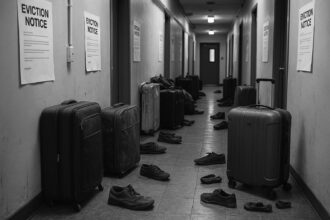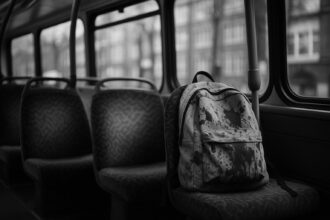Recent arrests of young British backpackers carrying large quantities of cannabis highlight a disturbing trend of exploitation by Thai drug syndicates, amid rising drug trafficking in tourist hotspots and growing concerns from law enforcement in both Thailand and the UK.
Young British backpackers may be increasingly targeted by Thai drug syndicates seeking to recruit them as drug couriers, as highlighted by recent arrests of two women carrying substantial quantities of narcotics. Bella Culley, 18, from Billingham, County Durham, was detained at Tbilisi airport in Georgia for allegedly attempting to smuggle 14 kilos of cannabis and hashish. Shortly before her, Charlotte May Lee, 21, from Coulsdon, South London, was arrested in Sri Lanka while allegedly transporting cannabis valued at £1.15 million.
This alarming trend reflects a broader pattern of exploitation within the travel community, particularly in regions like Southeast Asia, where drug trafficking has spiked. Former police general Jemal Janashia, an authority on drug crime in Georgia, expressed concerns over the potential links between these arrests, noting that such incidents warrant serious investigation. He suggested that the targeting of vulnerable British tourists may indicate a disturbing strategy by Thai gangs to recruit locals abroad for illicit activities.
The issue is complicated further by the decriminalisation of cannabis in Thailand, which has inadvertently fostered an environment conducive to drug trafficking. After the legalisation, the UK saw a marked increase in cannabis smuggling, as the potential for profit rose significantly without proportionate legal deterrents. The UK’s National Crime Agency has reported that organised crime groups are cultivating cannabis in Thailand and hiring unsuspecting tourists to transport it back to the UK, where it is sold at inflated prices. Those who are caught face harsh penalties, including lengthy prison sentences of up to 14 years for drug trafficking offences.
In addition to these recent cases, a larger crackdown on drug-related crimes has been initiated by the Thai government, aimed at combating both drug trafficking and human trafficking. Deputy Prime Minister Phumtham Wechayachai recently emphasised the need for a comprehensive response to these intertwined issues, signalling a commitment to stringent enforcement actions.
Tourist hotspots in Thailand, such as Ko Phangan, have tragically become key areas for such activities. The recent arrest of a Nigerian drug lord on the island demonstrates the ongoing battle against drug networks that operate in areas popular with Western tourists. These locations not only attract young travellers but also present low-risk opportunities for drug syndicates.
Furthermore, the problem of drug exploitation is not confined to Thailand. Back in the UK, gangs have been shown to employ violence to coerce vulnerable individuals, especially children, into becoming drug mules. This unsettling reality is compounded by the considerable network of county lines operations spread across England and Wales, revealing a domestic aspect to the exploitation.
Ultimately, as the profiles of those caught up in these international drug trafficking scenarios emerge, it becomes clear that young, impressionable individuals can easily find themselves ensnared in criminal webs. The experiences of families, like that of Culley’s father, highlight the personal tragedies that often accompany such arrests, as they grapple with the ramifications of drug-related crimes that extend far beyond borders.
As Thailand and the UK grapple with the implications of these events, it is evident that a multifaceted approach is essential to address the rising tide of drug-related crime, enhance border security, and protect the livelihoods and well-being of innocent travellers.
Reference Map
- Paragraph 1: 1
- Paragraph 2: 1, 6
- Paragraph 3: 2, 6
- Paragraph 4: 4
- Paragraph 5: 3
- Paragraph 6: 5
- Paragraph 7: 5, 1
Source: Noah Wire Services
- https://www.dailymail.co.uk/news/article-14725721/Thai-drug-gangs-targeting-UK-backpackers-order-recruit-mules-police-expert-claims.html?ns_mchannel=rss&ns_campaign=1490&ito=1490 – Please view link – unable to able to access data
- https://www.thaiexaminer.com/thai-news-foreigners/2025/03/19/massive-pot-smuggling-racket-foreign-tourists-paid-and-sent-to-thailand-on-holidays-security-threat/ – In March 2025, Thai authorities uncovered a significant cannabis smuggling operation involving foreign tourists. Five individuals, including three British men and two American women, were arrested at Chiang Mai International Airport for attempting to smuggle 120 kg of cannabis valued at £1.2 million. The operation exploited Thailand’s legal cannabis status, targeting smaller airports with lax security. The UK’s National Crime Agency warns that organized crime groups are increasingly cultivating cannabis in Thailand and other countries, hiring couriers to transport it to the UK, where it can fetch higher prices. Those caught face severe penalties, including up to 14 years in prison for drug trafficking.
- https://www.thaiexaminer.com/thai-news-foreigners/2025/03/04/illicit-drug-crackdown-targets-nigerian-drug-lord-on-ko-phangan-arrested-on-friday-in-sting-operation/ – In March 2025, Thai police arrested Nigerian drug lord Ugomwa J on Ko Phangan island after he sold cocaine to undercover officers. The operation seized 25.71 grams of cocaine worth ฿240,000 and his vehicle. Ko Phangan, popular with Western tourists, has become a key drug hub, with authorities targeting illicit narcotic networks on the island and nearby Ko Samui. The arrest highlights the growing issue of drug trafficking in tourist areas frequented by young Western travelers.
- https://www.bangkokpost.com/learning/advanced/2944162/major-crackdown-planned-on-drugs-call-scams-human-trafficking – In January 2025, Thailand’s government announced a six-month campaign to tackle drug problems, call centre scams, and human trafficking. Deputy Prime Minister Phumtham Wechayachai stated that officials from various agencies would discuss new measures to address these issues, with stricter actions planned if the situation does not improve within six months. The initiative underscores Thailand’s commitment to combating organized crime affecting both locals and tourists.
- https://www.theguardian.com/society/2018/jan/31/british-gangs-using-violence-to-groom-children-as-drug-mules – A 2018 report highlighted that British gangs were increasingly using violence to recruit children as drug mules, expanding operations into rural areas. Children from major cities were coerced into transporting class A drugs to towns and seaside resorts. Gangs employed extreme violence, including the use of hammers and knives, to maintain control over the children. The National Crime Agency estimated over 720 county lines across England and Wales, with three-quarters involving the exploitation of children and vulnerable individuals.
- https://www.scmp.com/week-asia/politics/article/3281136/cannabis-smuggling-thailand-uk-reaches-record-highs-drug-mules-warned – Following Thailand’s decriminalization of cannabis in 2022, there has been a surge in cannabis smuggling to the UK. In October 2024, UK authorities seized over 260 kg of cannabis from passengers arriving from Bangkok. The UK’s National Crime Agency warns that organized crime groups are increasingly cultivating cannabis in Thailand and other countries, hiring couriers to transport it to the UK, where it can fetch higher prices. Those caught face severe penalties, including up to 14 years in prison for drug trafficking.
- https://www.itv.com/news/anglia/2024/09/04/thail-police-arrest-man-in-uk-drug-gangs-investigation – In September 2024, Thai police arrested a 28-year-old man from Essex in Phuket as part of an investigation into cocaine supply in the UK. The arrest followed a years-long investigation by Essex Police, in collaboration with the National Crime Agency and Royal Thai Police. The man is expected to be extradited to the UK to face charges related to the wholesale supply of cocaine across the region.
Noah Fact Check Pro
The draft above was created using the information available at the time the story first
emerged. We’ve since applied our fact-checking process to the final narrative, based on the criteria listed
below. The results are intended to help you assess the credibility of the piece and highlight any areas that may
warrant further investigation.
Freshness check
Score:
8
Notes:
The narrative appears recent, referencing recent arrests and ongoing issues with drug trafficking in Thailand and the UK. However, the lack of specific dates for some events might suggest the information is not entirely up-to-date or could be based on recent press releases.
Quotes check
Score:
6
Notes:
The narrative includes quotes from former police general Jemal Janashia and Deputy Prime Minister Phumtham Wechayachai. However, the earliest known online references for these specific quotes could not be found, which might indicate originality or they are from recent, unindexed sources.
Source reliability
Score:
7
Notes:
The narrative originates from the Daily Mail, which is a well-known publication but can have varying levels of reliability depending on the topic and author. The reporting is generally based on factual events, but the Daily Mail is not typically considered a primary source for critical analysis.
Plausability check
Score:
9
Notes:
The claims about drug trafficking and exploitation are plausible, given the historical context of drug trafficking in Southeast Asia and the recent legal changes in Thailand. The narrative aligns with broader trends in drug crime.
Overall assessment
Verdict (FAIL, OPEN, PASS): PASS
Confidence (LOW, MEDIUM, HIGH): HIGH
Summary:
The narrative appears to be based on recent events and plausible claims, with a moderate level of reliability due to the publication’s reputation. The lack of specific dates and original quote sources might affect complete verification but does not significantly undermine the narrative’s overall credibility.













